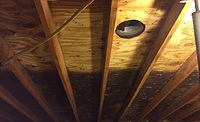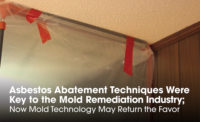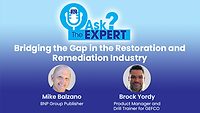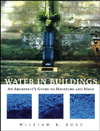The Institute of Inspection, Cleaning and Restoration Certification (IICRC) published the Standard and Reference Guide for Professional Mold Remediation, Standard S520 in December of 2003. The development of the S520 was executed by a multi-disciplinary committee of industry volunteers comprised of individual, organizational, and corporate contributors.
The IICRC S520 defines an indoor environmental professional (IEP) as an individual who is qualified by knowledge, skill, education, training, certification and/or experience to perform an “assessment” of the fungal ecology of structures, systems, and contents at the job site, create a sampling strategy, sample the indoor environment, submit to an appropriate laboratory or individual, interpret laboratory data, determine Condition 1, 2 and 3, and verify the return of the fungal ecology to Condition 1.
The IICRC S520 states that, "There is no single designation, license, or certification that qualifies an IEP.” The IICRC S520 committee approved the Standard including its definition of “indoor environmental professional” as a generic industry term, with the full expectation that “indoor environmental professional” and its acronym, “IEP” would remain available for use by the industry as a generic industry term, a term of art. Remediation firms and others who hire IEPs should consider the individual’s knowledge, skill, education, training and experience to best judge their ability and qualifications.
The S520 Consensus Body continues to use the IEP terminology in the newly revised S520 due in late August 2008, with the understanding that the terms are used in the document and in the remediation industry as a generic description, and not as a title, designation or certification. The parties to the agreement further agreed that:
- no single organization, for-profit or non-profit, will claim exclusive rights to use the term “indoor environmental professional” or “IEP,” including as a trademark, service mark or certification mark;
- the terms “indoor environmental professional” and “IEP” are and shall remain available for use as generic or descriptive terms;
- they will not use the term “indoor environment professional” or acronym "IEP" in the name or title of a licensing, qualification, certification or other credentialing program;
- to actively monitor attempts to gain exclusive rights, including trademark or certification mark or other intellectual property rights, in the terms "indoor environmental professional" or "IEP" in connection with indoor air quality or mold licensing, training and certification; and
- to report such attempts to other parties to this agreement.
The newly approved IICRC S520 Standard has language in the foreword regarding this agreement. It states: “The terms “indoor environmental professional” and “IEP” are used in this document and in the remediation industry to generically describe individuals having advanced technical competency in a wide range of subjects related to mold in the built environment, that qualify them to perform assessments and related professional services typically provided by an IEP, as defined in this document.
“Because there is such a broad array of skills encompassed within the description of an IEP,” said IICRC President, Ruth Travis. “It is impossible to develop a single, meaningful course of study that would adequately address the advanced levels of knowledge an IEP should possess within their area of specialization. Therefore, the terms “indoor environmental professional” and “IEP” are used in this document and in the remediation industry as a description, and not as a title, designation, certification, trademark or service mark.”
Consequently, there is no single license, designation or certification that qualifies an IEP. Travis adds, “The qualifications required for an IEP are often gained through years of formal study at the university level, specific training related to mold and the indoor environment, and years of on-the-job work experience, or a combination of these factors. Therefore, the IICRC does not offer or recognize a professional certification or designation for an IEP, and prohibits the exclusive use or co-option of the terms “indoor environmental professional” and “IEP” in association with any one individual, entity or organization, as such use would be contrary to the intent of this document. However, use of the terms “indoor environmental professional” and “IEP” as a generic description is permitted.”
Remediators and others who engage an indoor environmental professional are advised to consider the individual’s knowledge, skill, education, training and experience to best judge their ability, qualifications and competence, as further explained in this document.






